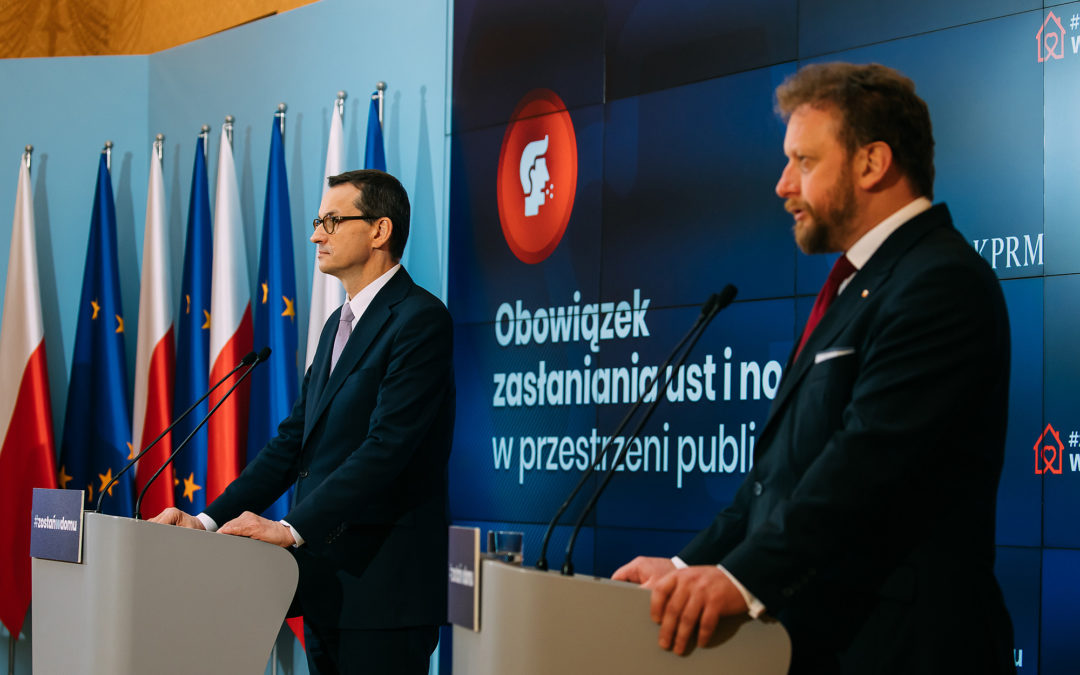Poland’s government today announced an extension to restrictions designed to mitigate the spread of the coronavirus.
The measures, which are listed more extensively at the bottom of this article, include a ban on under-18s leaving the house unaccompanied and a requirement for pedestrians, even if they are from the same household, to remain at least 2 metres apart in public.
The current rules on retailing and non-essential services, including compulsory wearing of gloves in shops and limits on customer numbers, have been extended to 19 April. The suspension of international air and rail connections will remain until 26 April, and border restrictions limiting entry to the country until 3 May.
Moreover, restrictions on public gatherings will continue indefinitely. This includes limiting religious services to a maximum of five people, not including clergy. As a consequence, millions of Poles will be unable to attended church for Easter as normal.
The health minister has again appealed to people to stay at home over Easter and not visit family. "Let these holidays be about life, not death"
He confirmed that current restrictions are to be extended and new ones added, but says they won't be "drastic" https://t.co/a5EhOBDVgt
— Notes from Poland ?? (@notesfrompoland) April 9, 2020
Among new measures, there will also be a requirement for people to cover their mouth and nose in public, beginning next Thursday. Asked about whether masks will be provided, health minister Łukasz Szumowski replied that a piece of material, such as a scarf, can be used instead.
The government has also announced that schools will be closed for at least another two weeks. Upcoming primary and high school exams, due to take place in late April and May, will thus be pushed back. The new date will be announced no later than three weeks before the exams, and is not expected to be before the second half of June.
“The quarantine is proceeding in a very disciplined manner,” said Morawiecki, changing his tone from last week, when he justified stricter new measures by saying that Poles had “unfortunately not maintained social discipline as much as we should”.
“If it were not for the restrictions, the isolation, the national quarantine, today we would have 20, 30, 40 thousand cases of the virus. We would have a situation akin to that in Italy, France and Spain, where doctors decide who is treated,” said Szumowski, speaking alongside Morawiecki.
As of this morning, Poland has reported 5,341 confirmed cases of coronavirus, including 164 deaths.
Poland today announced its highest daily number of coronavirus deaths (30, bringing the total to 159). The total number of confirmed cases of infection has also now passed 5,000.
Via: https://t.co/yrpMUNX32I pic.twitter.com/OnHn4ixITA
— Notes from Poland ?? (@notesfrompoland) April 8, 2020
The prime minister also announced that after Easter the government will publish a schedule for “coming back to a new economic reality.”
Yesterday, the government announced a second economic support package worth 100 billion zloty (€22 billion), which includes preferential loans and non-refundable subsidies to businesses that have suffered at least a 25% drop in turnover.
Speaking about the package today, Morawiecki thanked businesses for trying to keep workers on board “in these tough conditions”. He added: “I believe that Polish business and the Polish economy will come out slightly mauled, but stronger than others” and ready for international expansion in the near future.
Meanwhile the presidential election scheduled for May is still set to go ahead, after legislators this week pushed through a controversial bill allowing the ballot to be held exclusively by postal vote. Opposition parties, who want the elections postponed, have been united in condemning the new measures.
The proposed legislation, which has now gone to the Senate, also empowers the speaker of the lower-house Sejm, from the ruling Law and Justice (PiS) party, to postpone the elections by a week, giving postal services more time to organise the vote.
Restrictions announced on 31 March included:
- Those aged under 18 can only leave the home under the supervision of an adult guardian
- Pedestrians must remain 2 metres apart from one another, even if they are walking together. This includes members of the same family. Exceptions are made for children under 13 or people with disabilities
- Shops can only admit 3 customers at the same time for each cash register they have (for example, a shop with 3 cash registers can admit 9 customers)
- Outdoor markets and post offices have similar restrictions on customer numbers
- Customers in all shops must wear disposable gloves
- Workplaces must separate work stations by at least 1.5 metres and employees must wear gloves
- Parks, beaches and various other public recreation spaces are closed
- Hotels and other short-term rental accommodation are closed (apart from those for use in quarantine or isolation, or for medical personnel)
- Grocery shops and pharmacies can only serve customers over 65 years old between 10 a.m. and 12 p.m. every day
- Hair and beauty salons, tattoo parlours are closed (and home visits not permitted either)
- Bike rental services are closed
- Anyone living with a person under a legal quarantine order must also be quarantined
For all of our coverage of the coronavirus epidemic in Poland, see our constantly updated archive of stories here.
Main image credit: Krystian Maj/KPRM/Flickr(under CC BY-NC-ND 2.0)

Maria Wilczek is deputy editor of Notes from Poland. She is a regular writer for The Times, The Economist and Al Jazeera English, and has also featured in Foreign Policy, Politico Europe, The Spectator and Gazeta Wyborcza.




















